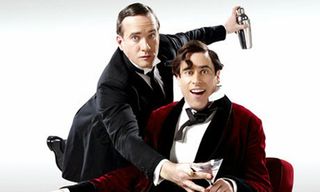Theatre review: Perfect Nonsense
Holly Kirkwood has a wonderful evening at Perfect Nonsense, at the Duke of York's Theatre in London


If you'd asked fans of the emotionally unavailable leading man on BBC spy drama spooks, Matthew Macfadyen, back in 2002 where his career might take him it's a fair bet few would have guessed the role of Madeline Bassett. Mr Darcy? He'd be a natural, you would have said. (and indeed he was). Mr Rochester? No problemo (and why not?) But Madeline Bassett? Pigs might fly, you would have said. Of course now we know different.

* Subscribe to Country Life this Christmas and receive a bottle of single malt
Unlikely candidate though he seems, Mr Macfadyen has thrown himself utterly into the multiple roles he is called upon to perform in 'Perfect Nonsense' at the Duke of York's Theatre and it's a brave thing to do. As everyone knows, Wodehouse is sacred. As Stephen Fry says of Blandings: ‘You don't analyse such sunlit perfection, you just bask in its warmth and splendour.' Worrylingly, Blandings has been recently mauled by television: watching just 90 seconds of the leaden attempt by the BBC to recreate its charms earlier this year was traumatic to say the least.
The first staged Jeeves and Wooster also carries the risk of failure. As Mr Fry has also pointed out on many occasions, the genius of Wodehouse is the way the words work on the page: ‘One of the gorgeous privileges of reading PG Wodehouse is that he makes us feel better about ourselves because we derive a sense of personal satisfaction from the laughter mutually created. Every comma, every "sir", every "what?" is something we make work in the act of reading.' Of course this is something one just can't do in the theatre. Thank goodness, then, that it becomes quickly apparent as soon as this play begins, that we are in safe hands. Sean Foley is an accomplished comic director, and the Goodale Brothers' adaption is joyful.
With just three characters on stage: Bertie (Stephen Mangan), Jeeves (Macfadyen) and Aunt Dahlia's butler Seppings (the excellent Mark Hadfield), the scene is set for a farce of perfect proportions. Stephen Mangan's Bertie is suitably toothy, and relentlessly cheerful, and it is his re-enactment of The Code of the Woosters for the audience, as Jeeves and Steppings struggle to recreate events as they happened, which provides the framework for the play. This device allows for plenty of Noises-Off-style jokes about the putting on of a performance which come off very well.
Foley has clearly enjoyed pushing Macfadyen, Mangan and Hadfield all to the limit of what they can physically achieve - and they seem to be enjoying it also. Mr Macfadyen is frequently in what seems like three places concurrently, while Mr Hadfield's range of wigs is impressive, and his Roderick Spode is a brilliant realisation of a formidable fictional figure.
But let us return to Miss Bassett. Just as Wodehouse's prose seems so effortless, in this production Macfadyen easily manages the near-impossible feat of playing Jeeves representing Madeline, while dressed as her father. He conveys both Jeeves squirming and Miss Bassett coquetting simultaneously; few would have thought such comic range possible from an actor so clearly born to play the romantic interest, but he pulls it off beautifully.
Sign up for the Country Life Newsletter
Exquisite houses, the beauty of Nature, and how to get the most from your life, straight to your inbox.
There is another Wodehouse book which comes highly recommended by aficionados: Pigs Have Wings. Perhaps that might be the next of his novels bound for the West End?
* Follow Country Life magazine on Twitter
-
 From California to Cornwall: How surfing became a cornerstone of Cornish culture
From California to Cornwall: How surfing became a cornerstone of Cornish cultureA new exhibition at Cornwall's National Maritime Museum celebrates a century of surf culture and reveals how the country became a global leader in surf innovation and conservation.
By Emma Lavelle Published
-
 Jaecoo 7 SHS: Can you really get a luxury SUV for £35,000?
Jaecoo 7 SHS: Can you really get a luxury SUV for £35,000?The Chinese automaker Jaecoo lands on UK shores with the 7. We take it for a spin around Scotland and the north of England to see if the hype is real.
By Charlie Thomas Published
